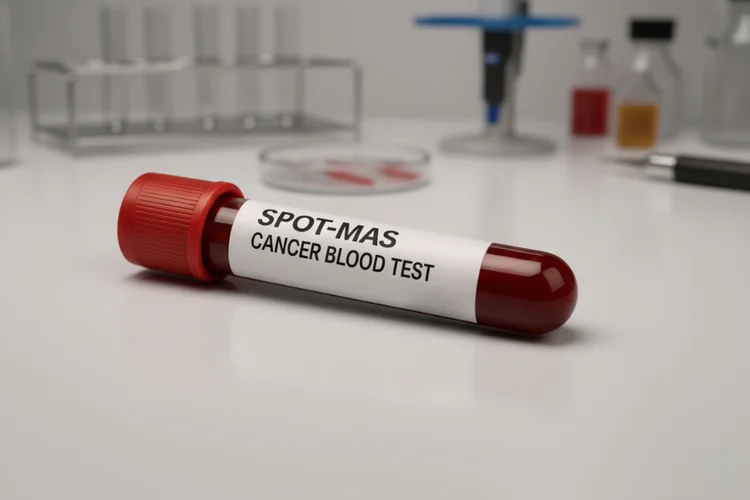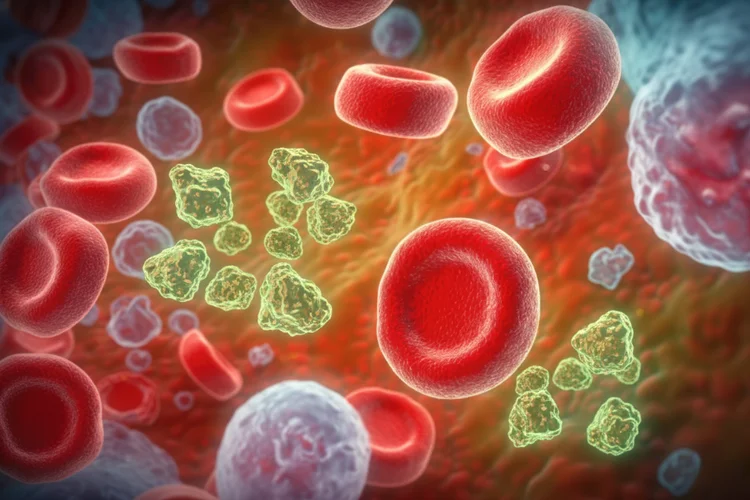SPOT-MAS™ Cancer Blood Test
| Test Name | SPOT-MAS™ Cancer Blood Test |
| Purpose | Screens for early signs of cancer across 10 organ systems, covering 75 subtypes, by analysing circulating tumour DNA (ctDNA) with advanced next-generation sequencing and artificial intelligence. |
| Recommended For | Individuals aged 40 years and above, as well as younger adults with increased cancer risk linked to factors such as hereditary conditions, long-term liver disease, tobacco use, or a strong family history of cancer. |
| Price | $899 NETT and inclusive of GST |
| Appointment Options |
Same-day appointment (subject to availability). Book via WhatsApp: 8893 3757 or email: hello@healthscreening.sg |
| Clinic Locations |
Orchard: 1 Orchard
Blvd #05-09 Camden Medical Centre, S248649 Tanjong Pagar: 72 Anson Rd #01-02 Anson House, S079911 |
What Is the SPOT-MAS Cancer Blood Test?
The SPOT-MAS Multi-Cancer Early Detection (MCED) Test is a screening tool that uses a single
blood sample to detect genetic traces of cancer before symptoms appear.
Developed by Gene
Solutions, this test identifies small fragments of DNA released by cancer cells into the
bloodstream.
Using next-generation sequencing and artificial intelligence, SPOT-MAS can detect molecular
signals of cancer across 10 organ systems and 75 cancer subtypes, including
several without established screening programmes.
Across Asia, more than 70% of cancers in lower-
and middle-income countries are identified at a late stage, when treatment choices are limited
and survival is poorer. Early detection with blood-based MCED tests such as SPOT-MAS can broaden
treatment options, improve survival prospects, and may help reduce cancer-related deaths.

Which Cancers Does The Spot-Mas Test Screen For?
The SPOT-MAS test is designed to detect early signals of cancer across 10 organ systems, covering 75 cancer subtypes that collectively account for more than 60% of cancer deaths in Southeast Asia. These include cancers of the:
- Breast
- Colorectum
- Endometrium (uterus)*
- Head and neck*
- Liver and biliary tract*
- Lungs
- Oesophagus*
- Ovaries*
- Pancreas*
- Stomach*
*These cancer types currently have no established routine screening programmes available.
Identifying common cancers such as breast or colorectal cancer at an early stage can lead to survival
rates exceeding 90%, underscoring the importance of comprehensive screening.
How Does the SPOT-MAS Test Work?
The SPOT-MAS test analyses circulating tumour DNA (ctDNA), which are tiny
fragments of genetic material released into the bloodstream when tumour cells break down. These
fragments contain molecular features that differ from those of healthy cell DNA.
Through a simple blood sample, the test studies several ctDNA characteristics, including genetic mutations,
methylation changes, and fragment patterns, using next-generation sequencing and artificial
intelligence analysis. This in-depth process helps determine whether cancer-associated DNA is
present and, if so, suggests the likely tissue of origin.
It is important to remember that SPOT-MAS is a screening test rather than a diagnostic
one. If the results indicate possible cancer signals, additional imaging or
confirmatory diagnostic procedures such as a biopsy are required to verify the presence of
cancer.

What Are the Benefits of the SPOT-MAS Test?
The SPOT-MAS Cancer Blood Test provides a proactive approach to cancer screening with several notable advantages:
1. Early Cancer Detection
By identifying tumour DNA before symptoms arise, SPOT-MAS allows for earlier medical
evaluation and treatment, improving potential treatment outcomes.
2. Screens for Multiple Cancers at Once
A single blood draw can detect signals from multiple cancer types simultaneously,
including those without existing screening programmes.
3. Non-Invasive and Convenient
The test requires only a small blood sample, offering a quick, comfortable, and
minimally invasive option suitable for periodic monitoring.
4. High Sensitivity and Accuracy
Clinical data indicate 78% sensitivity (ability to detect cancer when it is
present), 99.8% specificity (accuracy in identifying non-cancer cases), and 84%
accuracy in locating the tissue of origin.
5. Complements Standard Screenings
Works alongside screenings such as mammograms, colonoscopies, and pap smears to
provide more comprehensive cancer surveillance.
Who Should Consider the SPOT-MAS Test?
The SPOT-MAS test is particularly suitable for adults aged 40 and above, as well as younger individuals who have known cancer risk factors. These include:
- Frequent alcohol consumption, defined as about 15 cans of beer weekly for men or 8 cans for women.
- Heavy smokers with a smoking history equivalent to 20 pack-years.
- Chronic liver conditions, including long-term Hepatitis B or C infections.
- Family history of cancer, particularly among close relatives.
- Genetic predisposition, such as carriers of inherited mutations in BRCA1, BRCA2, or TP53 genes.
Those with multiple risk factors or significant family history may benefit from including the test as part of their annual health check-up for continuous monitoring.

How Is the SPOT-MAS Test Performed?
The entire SPOT-MAS testing process is straightforward and typically completed in 3 key steps:
- Consultation and Blood Collection – A medical consultation assesses your health status and suitability for the test. If appropriate, a blood sample is collected during the same visit.
- Laboratory Processing – The sample is analysed in a certified genomics laboratory, where advanced sequencing and AI tools evaluate ctDNA patterns for possible cancer signals.
- Results and Discussion – Results are generally ready within 12 working days. They are reviewed and explained during a follow-up consultation, where next steps or additional testing can be discussed if necessary.
At our clinic, the appointment including consultation and blood draw typically takes 30 to 60 minutes during off-peak hours. Contact us to arrange a convenient time for your visit.
Understanding Your SPOT-MAS Test Results
SPOT-MAS outcomes are grouped into two result categories:
| Result | Explanation |
|---|---|
| Negative result |
No ctDNA was detected in your sample, suggesting that tumour-related DNA was not present at the
time of testing. However, this does not guarantee lifelong absence of cancer risk.
Periodic retesting or additional screening may still be recommended. |
| Positive result |
ctDNA signals were identified, indicating potential tumour activity. The test may suggest one or
two possible tissue origins.
Additional imaging or diagnostic investigations are needed to confirm whether cancer is present. |
What Is the Cost of the SPOT-MAS Cancer Blood Test?
At healthscreening.sg, the SPOT-MAS Cancer Blood Test is available as part of our range of cancer screening options designed to support early detection and health monitoring.
| Test | Prices* |
|---|---|
| Consultation | From $49.05 |
| Cancer Blood Tests | |
| SPOT-MAS Cancer Blood Test | $899 |
| LucenceINSIGHT™ Cancer Blood Test (From 5 to 50 Cancers) | From $1,098 |
| Cancer-Related Screenings | |
| Mammogram (Women) | $201.65 |
| Ultrasound Breast with Mammogram (Women) | $305.20 |
| Pap Smear (Women) | From $0 (depending on eligible subsidies) |
| HPV Test (Women) | From $0 (depending on eligible subsidies) |
| Prostate-Specific Antigen (PSA) Blood Test (Men) | $38.15 |
| Ultrasound Prostate (Men) | $174.40 |
| Stool Occult Blood Test (Faecal Immunochemical Test) | $27.25 |
| Colonoscopy | From $2,398 |
*Prices are NETT and inclusive of GST.
Comprehensive health screening
packages are also available, combining the cancer-related tests with other diagnostic tools for
a broader overview of your health.
How to Book an Appointment for the SPOT-MAS Cancer Blood Test?
Why Choose Us?








Navigate Easy With Google Maps
Health Screening Singapore
(Anson House)
Health Screening Singapore
(Camden Medical Centre)
Frequently Asked Questions (FAQ)
Yes, certain blood tests can detect biological markers that may indicate the presence of cancer. Multi-cancer early detection (MCED) tests such as SPOT-MAS Cancer Blood Test or LucenceINSIGHT Liquid Biopsy analyse fragments of tumour DNA circulating in the bloodstream to identify potential cancer signals before symptoms occur. However, these tests are screening tools and not diagnostic; follow-up imaging or confirmatory tests are required if cancer-associated DNA is detected.
SPOT-MAS cancer screening is a blood-based multi-cancer early detection (MCED) test that detects fragments of tumour DNA circulating in the bloodstream. Using next-generation sequencing and artificial intelligence, it can identify early signals of cancer across 10 organ systems and 75 cancer subtypes, while also suggesting the likely tissue of origin. The test complements existing screening methods and supports earlier detection when treatment options are typically broader and outcomes more favourable.
The SPOT-MAS test has been shown to achieve 78% sensitivity, meaning it can detect cancer in about four out of five individuals who have it. It also demonstrates 99.8% specificity, which indicates a very low likelihood of false positives, and 84% accuracy in identifying where the tumour may have originated. These figures reflect clinical performance under study conditions and should be interpreted within the context of other screening results.
A blood test for early cancer detection analyses fragments of tumour DNA circulating in the bloodstream to identify molecular signs of cancer before symptoms develop. The SPOT-MAS Cancer Blood Test and LucenceINSIGHT Liquid Biopsy are examples that can screen for multiple major cancers using a single blood sample. These tests do not replace diagnostic imaging or tissue biopsy but can provide valuable insights for early evaluation.
Early cancer screening aims to detect abnormal cell changes or cancer-related signals before symptoms appear, improving the chances of timely treatment and better outcomes. Common screening methods include imaging tests such as mammograms, colonoscopies, and Pap smears. Blood-based options like multi-cancer early detection (MCED) tests, including the SPOT-MAS Cancer Blood Test and LucenceINSIGHT Liquid Biopsy, can identify potential cancer signals using a single blood sample.
The multi-cancer early detection (MCED) test is a blood-based screening that detects tumour DNA fragments circulating in the bloodstream to identify early signs of multiple cancers. In Singapore, examples include the SPOT-MAS Cancer Blood Test and LucenceINSIGHT Liquid Biopsy, which can screen for several cancer types simultaneously. These tests complement existing screenings and may help detect cancers that do not have standard screening programmes.
MCED tests are generally designed to detect cancer signals with a high degree of accuracy. The SPOT-MAS Cancer Blood Test, for example, has shown 78% sensitivity, 99.8% specificity, and 84% accuracy in identifying the tissue of origin. Sensitivity measures how well the test detects cancer when it is present, while specificity indicates its ability to confirm the absence of cancer. These findings are based on clinical studies and should be interpreted alongside other screening results.
Circulating tumour DNA (ctDNA) refers to small fragments of genetic material released into the bloodstream when tumour cells break down. These fragments contain molecular patterns distinct from normal cell DNA and can provide clues about the presence and type of cancer. Tests such as SPOT-MAS Cancer Blood Test and LucenceINSIGHT Liquid Biopsy analyse ctDNA using sequencing technology to identify cancer-related signals early. If ctDNA is detected, further diagnostic evaluation is required to confirm a diagnosis.
There is no single ‘best’ test that can detect all cancers with complete accuracy. The most suitable screening depends on factors such as age, medical history, and individual risk. Traditional methods like mammograms, Pap smears, and colonoscopies remain important, while newer blood-based tests such as the SPOT-MAS Cancer Blood Test and LucenceINSIGHT Liquid Biopsy can detect DNA signals from multiple cancers. It is advisable to consult your doctor to determine the most appropriate option.
